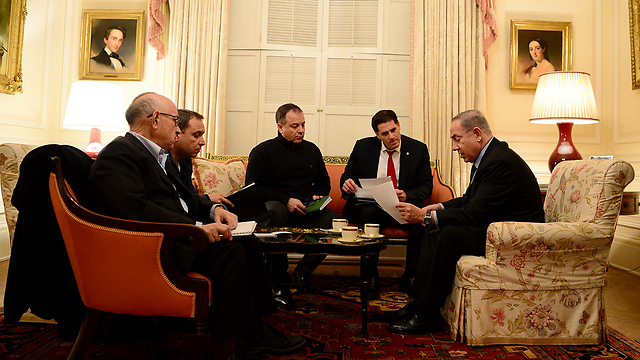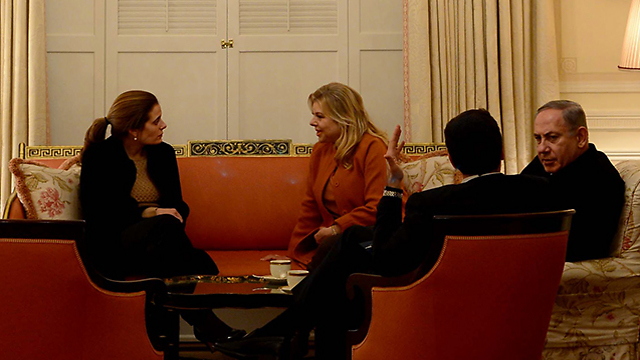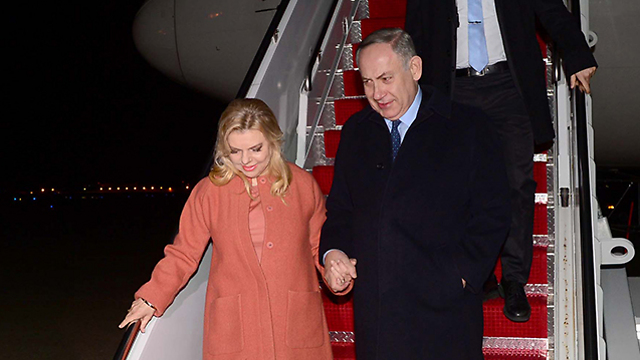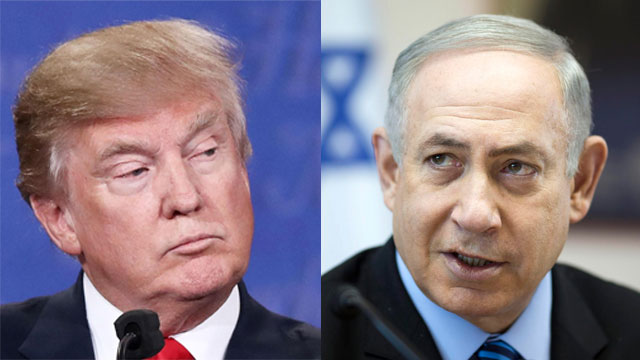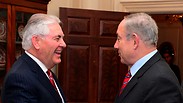
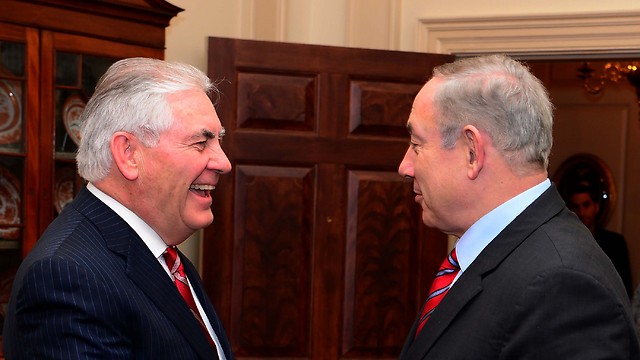
Report: White House may jettison two-state solution
Anonymous senior White House official says that forging a peace deal between the Israelis and Palestinians remains the ultimate goal, but that terms on how to achieve it, including two states, will not be dictated; Yedioth Ahronoth discovers that President Trump requested detailed reviews of investigations against Netanyahu ahead of the meeting.
The Trump administration suggested Tuesday that peace between the Israelis and Palestinians may not come in the form of a two-state solution—a position that could represent a major shift from what has been US policy for more than 20 years.
Speaking to reporters ahead of President Donald Trump's meeting Wednesday with Israeli Prime Minister Benjamin Netanyahu, a senior White House official said Trump is eager to begin facilitating a peace deal between the two sides and hoping to bring them together soon.
But the official, who was not authorized to speak publicly on the meeting beforehand, said it will be up to the Israelis and Palestinians to determine what peace will entail—and that peace, not a two-state solution, is the goal.
“The main goal is peace,” the official stated ahead of the meeting, “whether by way of a two-state solution, if the two sides want, or by other means agreed to by the sides.”
Insisting that Trump had no intention of dictating terms, forging peace was high on the president’s agenda.
Nevertheless, State Department officials expressed surprise at the comments and said Tuesday they were not aware of any policy shift on the desirability of a two-state solution.
Three officials said the department was seeking clarification from the White House comments, which came as Secretary of State Rex Tillerson was having dinner with Netanyahu. The officials spoke on condition of anonymity because they were not authorized to discuss the matter publicly.
Netanyahu tweeted Wednesday afternoon about the meeting that took place with Tillerson, repeating comments he made before he borded for Washington.
"Excellent meeting with US Secretary of State Rex Tillerson. The US-Israel alliance has always been strong, and it's about to get stronger," he wrote on Twitter.
Tillerson was the official who called Netanyahu shortly before the White House issued a press statement two weeks ago stating that while it had not formulated a policy on settlements, their construction may not be helpful.
Netanyahu would later tell express his view that “Indeed, it is true that it will be more comfortable for Israel but anyone who thinks that there won’t be limits on Israel is mistaken,” he said.
Trump Spokesman Sean Spicer said that Trump and Netanyahu would discuss an array of issues including strengthening the relationship between the two countries, the need to stabilize the region, the Iranian threat and the need to fight against ISIS and terror.
Spicer added that the two would discuss a future agreement between the Israelis and the Palestinians so that the two sides could live in peace.
Asked during his press conference whether Trump and Netanyahu would speak about moving the US embassy from Tel Aviv to Jerusalem, as promised by the president during his election campaign, Spicer remained evasive on the matter, stating that he has no intention of going ahead of Trump on the issue.
During his final White House news conference, Obama warned that the moment for a two-state solution "may be passing" and said the "status quo is unsustainable."
It was not clear if the White House had intended to declare a major shift in policy during the hastily arranged briefing Tuesday night.
Netanyahu is scheduled to meet with Trump at the White House Wednesday. The two leaders will hold a joint press conference before convening for meetings and a working lunch.
The prime minister will then head to Capitol Hill for meetings with lawmakers on both sides of the aisle, including Senate Majority Leader Mitch McConnell, House Speaker Paul Ryan and Senate Minority Leader Chuck Schumer.
Trump takes pride in his deal-making skills and said during his campaign that he'd love the challenge of negotiating a Mideast agreement. He has appointed his son-in-law, Jared Kushner, to lead the effort.
The official said the visit was meant to mark a new, closer relationship between Israel and the United States, which grew strained during the Obama years.
Trump told The Associated Press during his campaign that he wanted to be "very neutral" and try to get both sides together. But his tone became decidedly more pro-Israel as the campaign progressed.
He has said that Palestinians have been "taken over" by or are condoning militant groups. Some of his top aides challenge the legitimacy of Palestinian demands for a state.
After repeatedly clashing with Obama for eight years, capped by a UN Security Council resolution condemning Israeli settlements, Netanyahu seemed relieved by Trump's arrival. Trump slammed the US decision to abstain from the UN vote, saying in December that Israel is being treated "very, very unfairly."
Now in office, however, Trump has been forced to reevaluate and revisit his position on a number of issues—including those relating to Israel.
After initially greeting Israel's settlement announcements with a shrug, Trump appears to be having second thoughts. In an interview with a pro-Netanyahu Israeli daily Friday, Trump said, "I am not somebody that believes that going forward with these settlements is a good thing for peace."
In preparation for the meeting, Yedioth Ahronoth obtained information that the White House requested a detailed report on the ongoing investigations against the Israeli prime minister in order to ascertain whether Trump will be facing a man with whom he can do business, or a man who is about to make an exit from the political scene.
Moreover, despite the cordial relations which are expected to characterize the talks, White House officials were perturbed by comments in a cabinet meeting made by Netanyahu on Trump’s personality shortly before departing to Washington.
Indeed Netanyahu warned the ministers to be under no illusions: Trump still believed in carving out two states, meaning that Israel had to act with caution, particularly in light of his personality.
It is unclear what was written in the report provided to the president, but it is believed that White House officials interpreted these words as an insult.
While the meeting is expected to be much warmer than Netanyahu's famously tense encounters with Obama, the Israeli leader will still need to tread with caution on sensitive issues like Israeli construction in the West Bank, Iran and the war in Syria.
In dealing with such a divisive president, Netanyahu will also face some potential pitfalls. Key constituencies, including congressional Democrats and many American Jews, oppose Trump's policies, while at home Netanyahu is under pressure from his hard-line allies to push for policies that Trump may not support.
"Netanyahu seeks to shift the discussion in the US-Israel relationship away from settlements and peace and back to Iran so that he can put off the difficult political decisions that would roil his coalition and put his rule in jeopardy," said Yousef Munayyer, a political analyst and executive director of the US Campaign for Palestinian Rights.
"The challenge to Netanyahu is domestic," Munayyer added. "He spent so much time arguing that Obama was the problem that now that we are in the post-Obama era, his right-wing coalition partners want to exploit the moment and take huge steps that would further isolate Israel, trigger international condemnation from other corners, and potentially destabilize the land and Israeli politics."
Meanwhile, in Ramallah senior Palestinian official Hanan Ashrawi said that the change in US policy "does not make sense."
"This is not a responsible policy and it does not serve the cause of peace," Ashrawi said. "They cannot just say that without an alternative."
Trump has yet to speak directly to the Palestinian leadership since taking office.
Ahead of the visit, Netanyahu said he would handle ties with the US in a "prudent manner," but he steered clear of specifics.
The Israeli prime minister is also scheduled to have breakfast Thursday with Vice President Mike Pence before departing back to Israel.















